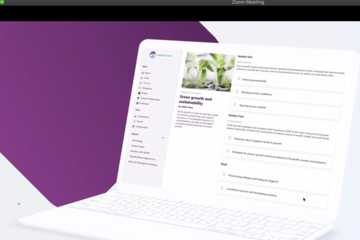Results for "youth"
67 Results
Giving Directions
Many students with ADHD have trouble following directions. Here are some guidelines that might help address this problem.
Number of Directions: Give a minimal number of directions or steps at a time.
If necessary, have students repeat the directions to the teacher or a peer partner.
Form of Directions: Provide written directions or steps, or a visual model of a
completed project. Teach students how to refer to these items as reminders of
process steps to complete tasks. This strategy is particularly helpful for long-term
projects.
By:
Jen Martins Henzansanath
Thursday, May 13, 2021
AGRI-FOOD SYSTEMS
+3
Leave a comment
Predominantly inattentive type. The student may: o submit inaccurate or incomplete work, o have difficulty attending to conversations, activities, or tasks, o be easily distracted, o have difficulty following directions, o frequently lose materials, and/or o have difficulty organizing tasks and materials.
By:
Anne miller New vijayalaxmi santosh mhetre mali
Thursday, May 13, 2021
YOUTH EMPOWERMENT

Leave a comment
Predominantly inattentive type.
The student may:
o submit inaccurate or incomplete work,
o have difficulty attending to conversations, activities, or tasks,
o be easily distracted,
o have difficulty following directions,
o frequently lose materials, and/or
o have difficulty organizing tasks and materials.
By:
Anne miller New vijayalaxmi santosh mhetre mali
Thursday, May 13, 2021
CULTURE AND SOCIETY
+1

Leave a comment
Supporting Rationale and Research
The following research informs and supports the development of globally and culturally competent students.
Mansilla and Jackson, Educating for Global Competence: Preparing our Youth to Engage the World, CCSSO and Asia Society. (2011)
http://asiasociety.org/files/book-globalcompetence.pdf
The resulting work of the EdSteps Global Competence Task Force details the relevance of global competence in education and describes practical applications that demonstrate what global competence looks like in interactions between educators and learners.
By:
Scarlet Patrick
Thursday, May 13, 2021
CULTURE AND SOCIETY
+1
No Preview Available
Leave a comment
Educating a new generation of globally and culturally competent students is imperative. A clear framework for global competence requires students to engage in robust and rigorous exploration that includes investigating the world, recognizing perspectives, communicating ideas, and taking action.
By:
Jenny Reze Scarlet
Thursday, May 13, 2021
AGRI-FOOD SYSTEMS
+1

Leave a comment
This is the third micro-credential in the “21st Century Learning through Global Education” stack. It is encouraged that the micro-credentials in this stack are earned in sequence, as each skill builds on the previous one in the stack.
By:
Jenny Reze Scarlet
Thursday, May 13, 2021
CULTURE AND SOCIETY
+1

Leave a comment
The educator uses current research and resources aligned with global education to create a yearly resource plan. The educator identifies strategies and activities that support the global competence framework, and incorporates them into lessons, assignments, activities, or assessments
By:
Jenny Reze Scarlet
Thursday, May 13, 2021
AGRI-FOOD SYSTEMS
+6
Leave a comment
School interventions should include a team approach across multiple settings, consisting of both
preventive and intervention strategies.
Interventions must be based upon assessment data that includes information about the student’s strengths and needs as well as the environmental conditions in which her characteristics of ADHD occur.
Progress monitoring and strategy adjustments are critical to the success of any intervention plan (Wolraich & DuPaul, 2010).
The first step in creating classroom supports for students with ADHD is understanding the
students’ strengths and needs. This involves formal and informal assessment, as well as
collaboration among educational professionals and the students’ families.
If a student is not responsive to behavioral strategies and interventions, more intensive interventions, such as functional behavior assessment and behavior intervention plans, should be considered (see Practical FBA).
No one intervention is universally effective for all students with ADHD. A combination of research-based and promising practices is recommended.
Here are several of these practices:
By:
Jim Silverman
Thursday, May 13, 2021
YOUTH EMPOWERMENT

Leave a comment
https://aapbridge.com/knowledgenetwork/groups/knowledgenetwork/stories/263
By:
Rizla Niaz
Thursday, May 13, 2021
CULTURE AND SOCIETY
+2
No Preview Available
Leave a comment
http://regardssurlaterre.com/en/news
https://wcom
/
https://www.venturit.com/
By:
Lorell Sandi
Thursday, May 13, 2021
HEALTH AND NUTRITION
+1
No Preview Available
Leave a comment
http://www.globalrust.org/awards/award-wit
Much educational research focuses on classroom learning and reveals the struggle with using digital media as part of school activities
By:
Lorell Sandi
Thursday, May 13, 2021
CULTURE AND SOCIETY
+1
No Preview Available
Leave a comment
PASET-RSIF PhD Scholarships in Applied Sciences, Engineering and Technology
https://www.rsif-paset.org/calls/scholarships-call/
By:
Lorell Sandi
Thursday, May 13, 2021
YOUTH EMPOWERMENT
No Preview Available

Leave a comment